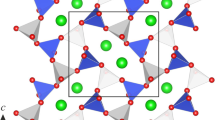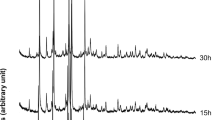Abstract
MUCH attention has been paid to the process of formation of mullite, a refractory mineral of the composition 3Al2O3.2SiO2, through decomposition of Al–Si clay minerals and crystallization of amorphous gels. In the course of my work on allophanes and related minerals1, a new tetragonal phase was encountered by heating the co-precipitated Al2O3–SiO2 gels at the temperature-range 910°–l,100° C.
This is a preview of subscription content, access via your institution
Access options
Subscribe to this journal
Receive 51 print issues and online access
$199.00 per year
only $3.90 per issue
Buy this article
- Purchase on Springer Link
- Instant access to full article PDF
Prices may be subject to local taxes which are calculated during checkout
Similar content being viewed by others
References
Ossaka, J., Advances in Clay Science, Proc. Second Ann. Meeting on Clay and Clay Minerals, 337 (1960).
Demeduk, T., and Cole, W. F., Nature, 181, 1400 (1958).
Scholze, H., Ber. D.K.G., 32, 381 (1955).
Agrell, S. O., and Smith, J. V., J. Amer. Ceramic Soc., 43, 69 (1960).
Author information
Authors and Affiliations
Rights and permissions
About this article
Cite this article
OSSAKA, J. Tetragonal Mullite-like Phase from Co-precipitated Gels. Nature 191, 1000–1001 (1961). https://doi.org/10.1038/1911000a0
Issue Date:
DOI: https://doi.org/10.1038/1911000a0
This article is cited by
-
Review of mullite synthesis routes by sol–gel method
Journal of Sol-Gel Science and Technology (2010)
-
Characterization of mono- and diphasic mullite precursor powders prepared by aqueous routes. 27Al and 29Si MAS-NMR spectroscopy investigations
Journal of Materials Science (1996)
-
Influence of gel-formation conditions on phase changes in polymer aluminosilicate gels of mullite composition
Refractories (1991)
-
Mullite formation from xerogels of (0.84–2.2) Al2O3·1SiO2
Journal of Materials Science (1991)
-
Comment on "A structural study of metastable tetragonal zirconia in an Al2O3-ZrO2-SiO2-Na2O glass-ceramic system"
Journal of Materials Science Letters (1988)
Comments
By submitting a comment you agree to abide by our Terms and Community Guidelines. If you find something abusive or that does not comply with our terms or guidelines please flag it as inappropriate.



